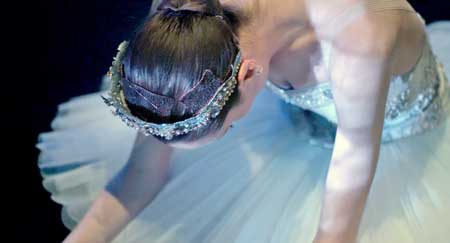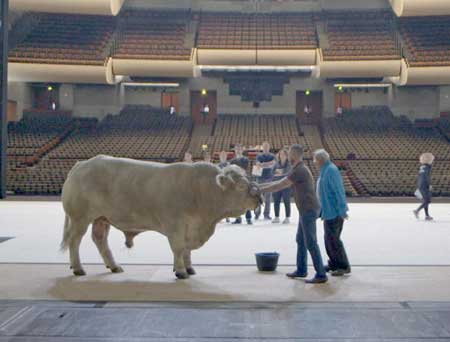Film
Documentary
Directed by Jean-Stéphane Bron
Kendall Square Cinema
Cambridge, MA
Opens October 27, 2017

from “The Paris Opera”
When veteran opera administrator Stéphane Lissner takes over at the Paris Opera in the fall of 2015 all kinds of intrigues about the business of opera production rise to the surface. Strikes by stage workers threaten, and administrative delicacy about publicizing the difficulties prevails.
This documentary, which tracks all the aspects of the behind the scenes dramas, uses cleverly inserted pieces of music to emphasize the operatic quality of the business of opera. Plenty of rehearsal moments fill between the behind the scenes ones and creates a wonderful pastiche of combined elements. The soundtrack is beautifully interleaved and we get a sense of the urgent dramatics of it with audience applause, curtain calls and the solitary goings on in the administration in offices and board rooms. The documentary is a grab bag of interlaced perspectives on the set of preparations and organizational processes but edited in such a way as to be fascinating.
As Schoenberg’s Moses und Aaron opens at the opera we watch from backstage and also watch Lissner sitting before his screen in his office taking it all in. The evocative music erupts and we see the wonderful staging from up close – involving a bull led onstage and an on-set swimming pool.
Intimate rehearsals of members of the corps de ballet and of a dancer rehearsing privately give a deeper sense of the intense work behind what appears onstage. Listening to and watching the preparation of a young Russian singer is a treat. His voice is richly satisfying and to see him work with a coach is a lovely inside look at music making.
The horrific terrorist events in Paris, at the Bataclan theater and elsewhere in November 2015, have just occurred and the film takes a serious turn as director Lissner acknowledges those terrible actions and the losses associated with them. Even a long, dramatic moment of silence is included. In light of those events, the goings on at the opera take on a new significance – an emblem of continuation and bravery in the wake of tragedy.
We watch a premiere ballerina gasp for breath backstage after her solo and then take her curtain calls. A glimpse of noted baritone Bryn Terfel in rehearsal follows, with a wonderful moment in which Terfel is interviewed and asked whether the young Russian baritone standing to the side is an admirer. “No, he’s a singer,” responds Terfel, “he’s in the same boat as me.”
Aides attend a soprano, worried about how much she sweats onstage. A rehearsal session with a pair of ballet dancers is passionate and exciting.

from “The Paris Opera”
A news conference with director Lissner about the leadership of the ballet by Benjamin Millepied gets heated and we see Millepied speaking with te corps de ballet in a honest heart to heart. Hearty congratulations about success in a ballet performance follow closely.
Moments of rehearsing a youth orchestra provide lovely scenes of children wrestling with their instruments. the camera lingers and studies each subject so we get a careful and penetrating sense of a few crucial perspectives. The entire film is shot and edited in this sort of interesting way that keeps things moving but doesn’t flutter around.
When a singer bails out of a production because of illness we watch the office staff scramble to replace him. Switching to the replacement getting prepared in the dressing room gives a relevant and touching update to the administrative flurry.
After a glimpse of the successful performance that follows, the camera dwells on a contentious board discussion of ticket prices. Encouragement of a talented child musician of color follows in a way that makes good sense and enriches the story.
Cinematography and editing are beautifully done, giving due to each scene while cutting in interesting ways make for a very well-made, interesting and dramatic documentary – moving and informative, and a must for opera lovers and Francophiles.
– BADMan
Leave a Reply